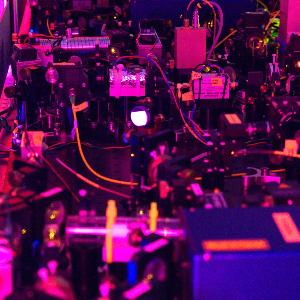Second stage for quantum simulation project PASQuanS
11 Apr 2023
The EU flagship project PASQuanS2 with 25 partners coordinated by Immanuel Bloch, Director at MPQ and Chair at LMU, is funded by the European Union.
11 Apr 2023
The EU flagship project PASQuanS2 with 25 partners coordinated by Immanuel Bloch, Director at MPQ and Chair at LMU, is funded by the European Union.

Experimental setup in a quantum lab | © LMU
Quantum technologies are on the rise. One promising area is the simulation of quantum many-body systems – the imitation of complex quantum systems consisting of many interacting particles in extremely controlled model systems. They enable the demonstration of fundamental quantum mechanical effects in their pure form, e.g. in superconductors, and allow deep insights into the quantum mechanics of these systems. Also, they can be used to create completely new physical systems.
Analogue and digital quantum simulators have made considerable progress in recent years and are evolving from purely scientific instruments for physicists to practical tools for real-world problems and industrial applications. They could, for example, support the development of new materials or improve the analysis of chemical processes.
One research effort that has contributed significantly to the advancement of quantum simulation technologies and applications is the European Quantum Flagship project PASQuanS, which was launched in 2018 as a collaboration between various experimental and theoretical research groups as well as industrial partners. The project partners – under the scientific leadership of Professor Immanuel Bloch, Director of the Department of Quantum Many-Body Systems at MPQ and Chair at LMU – have managed to effectively scale systems with atoms and ions and developed them into the most advanced platform for quantum simulations in existence to date. This successful mission is now to be continued with the extension of the PASQuanS2 project. The European Union is funding PASQuanS2 with 16.6 million euros over the next 3.5 years in the Horizon Europe framework programme.
For the next seven years, the 25 partners in the project – leading experts from research institutes, industry and small and medium-sized enterprises and start-ups from seven EU member states – have now under the leadership of the MPQ joined forces again in the framework project PASQuanS2 to further develop the hardware and software of quantum simulators for concrete scientific and industrial problems. In doing so, they have committed themselves to another ambitious goal: By the end of the project, verified next-generation quantum simulators consisting of up to 10,000 individual quantum systems should operate demonstrably stable and accessible to end users. “We’re delighted to be able to contribute to the ambitious goals of this consortium. An important part of our work will be to further develop local control capabilities for the quantum systems and expand the applicability of quantum simulators,” says Professor Monika Aidelsburger, whose Synthetic Quantum Matter research group at LMU was recently admitted to the consortium.
“Addressing these challenges calls for a concerted effort between experimentalists and theorists from the academic world and engineers from industrial partners, including hardware and software technologists working together with prospective end users,” underlines project coordinator Immanuel Bloch. “At the end of this first phase, we plan to have a quantum simulation ecosystem involving hardware platforms and corresponding bespoke software, enabling us to demonstrate a quantum advantage in academic and industrial problems in the second phase of PASQuanS2.”